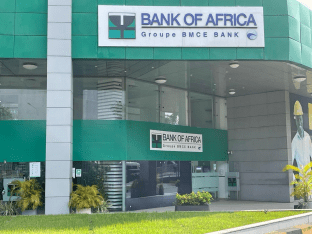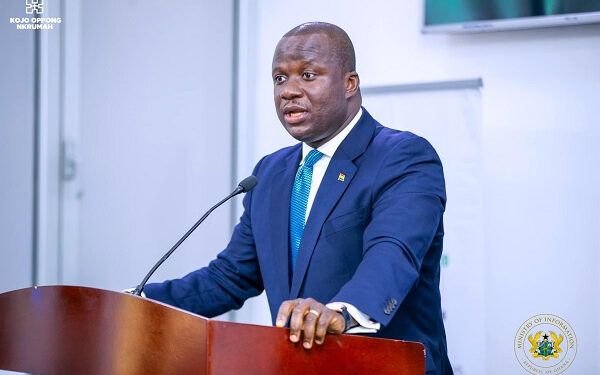Ghana, a country rich in culture and musical heritage, has birthed many local artists who have made significant contributions to the global music scene.
Ghanaian music is vibrant and diverse from highlife to hiplife and now Afrobeats. However, despite the talent and creativity that abound, many local artists face challenges in gaining recognition beyond the borders of their home country.
UK-based artiste manager, George Britton has sparked debate within the Ghanaian music industry with his assertion that songs from local artists struggle to make an impact beyond the country’s borders.
The music executive and founder of GB Recordz explained that, despite the vibrant nature of the industry, Ghanaian music remains largely confined within the country.
“Oh, our music industry is only within the confines of Ghana. For now, the Ghanaian music industry is heavy in Ghana, and that’s where it is.”
George Britton
He further lamented that Ghanaian songs rarely cross into neighboring countries or make a significant impact in Nigeria, which has one of Africa’s most dominant music industries.
“I mean, our songs don’t cross, and we don’t even move as close as our neighboring Ivory Coast or as far as Nigeria. How many songs from Ghanaian artists make it big outside? Maybe just one or two can penetrate Nigeria.”
George Britton
George Britton contrasted this with the influx of foreign music into Ghana, emphasizing that international acts from Nigeria and South Africa, for example, consistently have a strong presence in the country. “But ask yourself how many songs also move from the other side, like Nigeria, South Africa, etc., which also penetrate Ghana?” he questioned.
While Ghana has a vibrant local music scene, many artists struggle to find platforms that promote their music internationally.
Unlike artists from Nigeria, who have leveraged platforms like Afrobeat to gain global traction, local artists in Ghana often find themselves overshadowed.
The music industry in Ghana lacks the robust infrastructure seen in more developed markets. There are fewer record labels, marketing agencies, and distribution channels dedicated to promoting local talent on a global scale.
The global music scene is highly competitive, with artists from various countries vying for attention. Nigerian artists, in particular, have dominated the Afrobeat genre, making it challenging for Ghanaian local artists to carve out their niche.
The international success of Nigerian superstars like Burna Boy and Wizkid has set a high bar, making it difficult for others to break through.
Despite these challenges, there are success stories that provide hope for Ghanaian artists. Some have managed to break through the barriers and gain international recognition.
One of Ghana’s most celebrated rappers, Sarkodie has collaborated with international artists, including American rapper Vic Mensa. His music often features a blend of English and Twi, showcasing his cultural roots while appealing to a broader audience.
Stonebwoy has also made significant strides on the international stage, winning the International Reggae and World Music Award (IRAWMA) and collaborating with global artists like Beenie Man.
KiDi and Kuami Eugene have gained popularity with their catchy Afrobeat and highlife songs. Their collaborations with Nigerian artists have helped them reach a wider audience.
Strategies for Global Impact of Local Artists

The rise of streaming services like Spotify, Apple Music, and YouTube has opened new avenues for artists to share their music globally. By leveraging these platforms, Ghanaian local artists reach listeners far beyond their home country.
The Ghanaian diaspora is widespread, and engaging with these communities helps artists build a fan base abroad. Concerts, events, and social media campaigns targeting Ghanaians living overseas foster a sense of connection and support.
As a solution, George Britton suggested that Ghanaian local artists should adopt a more strategic approach to promoting their music internationally.
He used Kofi Kinaata as an example, encouraging him to market his Fante-language songs to global audiences, just as Nigerian singer Asake has done with his Yoruba-infused music.
High-quality music production and visuals are crucial in attracting international attention. Investing in professional production significantly elevates an artist’s music and enhances its appeal.
Artists participate in cultural exchange programs that promote Ghanaian music and culture abroad. Such initiatives create opportunities for performances, collaborations, and networking.
Ghanaian local artists possess immense talent and creativity, but the journey to international recognition is fraught with challenges.
By addressing the barriers of exposure, infrastructure, and competition, and by leveraging digital platforms and collaborations, they carve out a space for themselves on the global stage.
As the world becomes increasingly interconnected, the potential for Ghanaian music to resonate with international audiences is greater than ever.
With the right strategies and support, the future looks promising for these artists as they strive to share their unique sounds and cultural stories with the world.
READ ALSO: GRA Tax Refund Scandal Sparks Call for Accountability






















